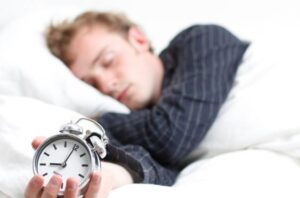Common Myths and Facts About Sleep – Don’t you ever wonder if all the advice out there regarding sleep is actually true or not? You’d be surprised to find out that a lot of what we believe about sleep isn’t really accurate.
We’ve all heard countless myths about sleeping: getting fewer than 8 hours of sleep will make you sluggish and overshooting it can lead to health issues. But which of these are true and which are merely myths? Sleep is a vital part of our daily lives, so it’s essential to understand what kind of impact it has on us.
Knowing the facts about sleep is important for living a healthy lifestyle, so let’s take a look at some of the most common myths related to sleep and debunk them right away. Let’s dive into discussing the most prominent misconceptions concerning our sleeping behavior.
Dispelling the Top 10 Sleep Myths
1. Adults need five or fewer hours of sleep
Adults need more than five hours of sleep each night to maintain optimal health and well-being. According to the US Centers for Disease Control and Prevention, a third of Americans are not getting enough sleep, with up to 45% of the global population being sleep deprived. Not getting enough sleep can have serious consequences on physical and mental health, including an increased risk for cardiovascular disease, early mortality, weakened immune system, weight gain, mood swings, depression, and a higher risk of diabetes, stroke, dementia, and some cancers.
Sleep is essential for our bodies to restore themselves. During REM and deep sleep cycles, our brains are highly reactive; storing memories, regulating moods, and learning new information as well as releasing human growth hormone which helps with muscle repair. Waking someone from deep sleep can be difficult as it can cause grogginess and fatigue that can affect mental performance for up to 30 minutes after waking. Therefore it is important that adults get at least seven hours of quality sleep each night in order to function at their best.

2. It’s healthy to be able to fall asleep ‘anywhere, anytime
Falling asleep instantly anywhere, anytime may seem like a superpower, but it is actually a sign of not getting enough sleep and accumulating a ‘sleep debt’. This happens when the body’s natural adenosine levels build up in the brain throughout the day. To reduce these levels, it is important to get adequate sleep each night. If you find yourself falling asleep easily during the day or having difficulty staying awake, consult the Epworth Sleepiness Scale or visit a sleep doctor for more extensive testing.
Hitting the snooze button can also disrupt your body’s natural REM cycle, leading to grogginess and fatigue. To break this habit, try moving your alarm to the other side of the room so that you have to physically get out of bed to turn it off. Additionally, don’t rely on voice-activated technology to turn off your alarm – it’s cheating! Getting into a regular sleeping routine will help you feel more rested and energized throughout the day.
3. Your brain and body can adapt to less sleep
Sleep is an essential part of our lives and it is important to get enough of it. Unfortunately, many people are not getting the recommended seven to nine hours of sleep each night. According to the US Centers for Disease Control and Prevention, a third of Americans sleep fewer than seven hours a night, and World Sleep Day statistics suggest that sleep deprivation is threatening the health of up to 45% of the global population. Sleeping five hours a night or less consistently increases one’s risk for adverse health consequences, including cardiovascular disease and early mortality.
The body goes through four distinct phases during sleep: light sleep, disengagement from the environment, deep sleep, and REM. During REM, the brain is highly reactive and dreams occur. Deep sleep is important for memory processing, neuron generation, and restoring the immune system. Poor sleep has been linked to high blood pressure, weakened immune system, weight gain, lack of libido, mood swings, paranoia, and depression as well as increasing the risk of diabetes, stroke, dementia, and cancer.
4. Snoring, although annoying, is mostly harmless
Snoring, although annoying, is mostly harmless. However, loud and raucous snoring can be a sign of sleep apnea, a dangerous sleep disorder that increases the risk for heart attacks, atrial fibrillation, asthma, high blood pressure, glaucoma, cancer, diabetes, kidney disease, and cognitive and behavioral disorders. It is estimated that 30% of the population suffers from sleep apnea but only 10% are diagnosed.
To break the habit of snoring and to ensure better quality sleep it is important to avoid hitting the snooze button as this can lead to grogginess. Instead, try putting your alarm on the other side of the room so you have to get up to turn it off. Asking Google or Alexa to turn off your alarm is not an acceptable solution as this does not help you break the habit of snoring.
5. Drinking alcohol before bed helps you fall asleep
Alcohol may seem like an easy way to help you fall asleep, but it can actually reduce the quality of your sleep. Alcohol traps you in the lighter stages of sleep and prevents you from reaching deeper stages, which is why you don’t feel restored after waking up.
Instead of relying on alcohol to help you fall asleep, there are other methods that can be more effective. Watching TV or using electronic devices before bed can disrupt the release of melatonin, the sleep hormone. The blue light emitted from these devices is especially disruptive to sleep, so it’s best to avoid them before bedtime. To reduce disruption, dim the brightness of screens or install an app that warms the screen to sunset colors. This will help create a more calming environment and make it easier for your body to relax and drift off into a restful sleep.
Getting enough quality sleep is essential for overall health and well-being, so it’s important to find ways to promote better sleeping habits. Avoiding alcohol and electronic devices before bed, as well as getting up at the same time every day can help you get the restful sleep your body needs.
6. Not sleeping? Stay in bed with eyes closed and try and try
Not getting enough sleep can be detrimental to our physical and mental health. It is important to take steps to ensure that we are getting the restful sleep we need. One of these steps is not staying in bed with your eyes closed if you are unable to sleep. While it may seem like a good idea, it does not provide the same benefits as actual sleep.
It is recommended to get out of bed and do something mindless like folding socks with the lights low. Drinking alcohol before bed may help you fall asleep, but it reduces the quality of sleep. Alcohol traps you in the lighter stages of sleep and prevents you from entering deeper stages of restful sleep. As a result, drinking alcohol before bed can leave you feeling unrested and not restored. Therefore, it is best to avoid drinking alcohol before bedtime if possible and instead focus on other methods for improving your quality of sleep such as avoiding screens or exercising during the day.
7. It doesn’t matter what time of day you sleep
Sleep is an essential part of life and it is important to maintain a regular sleep schedule. This helps keep the body’s biological clock in sync, which can help prevent disorientation, mental fog, and fatigue. Studies have shown that irregular sleep schedules can lead to health problems such as obesity, diabetes, and heart disease. Falling asleep instantly anywhere, anytime is a sign of not getting enough sleep.
Adenosine builds up in the brain throughout the day and sleeping reduces it. This helps us feel more alert during the day and allows us to perform better mentally and physically. A sleep doctor can do more extensive testing to check for sleepiness using the Epworth Sleepiness Scale. It doesn’t matter what time of day you sleep as long as you are getting enough quality restorative sleep each night. Having a consistent bedtime routine can help ensure that your body gets the rest it needs to function optimally during the day.
8. Watching TV in bed helps you relax
Watching TV in bed can be a great way to relax and wind down before sleep. However, it is important to be aware of the potential negative effects that this activity can have on your sleep. Blue light from electronic devices can disrupt the release of melatonin, the sleep hormone responsible for regulating our circadian rhythm. To reduce the impact of blue light on your sleep, you should dim the brightness of screens or install an app that warms the screen to sunset colors.
Alcohol may help you fall asleep faster, but it reduces the quality of your sleep. Alcohol traps you in lighter stages of sleep and prevents you from entering deeper stages which are essential for feeling rested when you wake up. Therefore, drinking alcohol before bed is not recommended as it can lead to waking up feeling unrestored. To ensure a good night’s rest, it is best to avoid watching TV or using electronic devices close to bedtime and limit alcohol consumption to at least two hours before going to bed.

9. Hitting snooze is great! No need to get up right away
Hitting the snooze button may seem like a great way to get a few extra minutes of sleep in the morning, but it can actually disrupt your sleep cycle and leave you feeling groggy and fatigued. To avoid hitting the snooze button, try moving your alarm clock to the other side of the room so that you have to physically get up to turn it off. Voice commands cannot be used as a substitute for turning off an alarm clock; this is considered cheating.
Falling asleep instantly anywhere, anytime is a sign that you are not getting enough sleep and your body is trying to repay its sleep debt. Adenosine levels build up in the brain throughout the day and sleeping soundly helps reduce them. If you’re having trouble sleeping or feel excessively sleepy during the day, consider taking the Epworth Sleepiness Scale test or consulting with a sleep doctor for more extensive testing. Taking steps to ensure adequate restful sleep will help keep your energy levels up throughout the day
10. Remembering your dreams is a sign of good sleep
Remembering your dreams is a sign of good sleep, as it indicates that the brain is actively processing information during the night. People who remember their dreams have higher brain activity in the information-processing hub of the brain and wake twice as often during the night. They are also more sensitive to sounds when sleeping and awake, which can help them recall their dreams more easily. However, mundane dreams are usually forgotten due to a lack of emotional context.
Alcohol may help you fall asleep but it reduces the quality of your sleep. It traps you in lighter stages of sleep and prevents you from entering deeper stages of sleep, leaving you feeling unrested and not fully restored. Therefore, if you want to remember your dreams and get a good night’s rest, it’s best to avoid drinking alcohol before bedtime.
Can you catch up on sleep from a prior night’s loss?
One of the most common myths about sleep is that you can catch up on lost sleep from a prior night. While it may be possible to make up for some of the lost sleep, it is not possible to completely make up for all of the lost hours.
The truth is that when you lose out on sleep, your body and mind suffer from the lack of restorative rest. Even if you try to make up for the lost sleep, your body and mind may still feel the effects of the lack of rest. Therefore, it is important to prioritize getting enough sleep each night in order to ensure that your body and mind are functioning optimally.
Can napping during the day make up for lost sleep?
Napping during the day can help to make up for lost sleep, but it is not a substitute for getting enough restful sleep at night. Naps can provide a short-term boost in alertness and energy, but they are not as effective as a full night’s rest in restoring your body and mind. Additionally, napping too late in the day can interfere with your nighttime sleep, so it is important to limit naps to earlier in the day.
Does eating cheese before bed cause nightmares?
The idea that eating cheese before bed can cause nightmares is a common myth. However, there is no scientific evidence to support this claim. In fact, the only thing that has been linked to nightmares is stress and anxiety.
While it’s true that some people may experience more vivid dreams after eating certain foods, such as cheese, this does not necessarily mean they will have nightmares. Eating cheese before bed is unlikely to cause nightmares, but it may be best to avoid eating a large meal before bed as this can interfere with sleep.

Is it better to go to bed at the same time every night?
When it comes to sleep, there are many myths and facts that can be confusing. One common myth is that it is better to go to bed at the same time every night. While having a consistent sleep schedule can help promote good sleep habits, this does not necessarily mean that you should go to bed at the exact same time every night.
The truth is that everyone’s body has its own natural sleep-wake cycle, and it is important to listen to your body’s cues in order to determine when you should go to bed. If you are feeling tired earlier than usual one night, it may be best to go to bed earlier than normal. On the other hand, if you are feeling more alert later in the evening, it may be better to stay up a bit later.
Conclusion
In conclusion, there are many myths and facts about sleep that can be confusing. It is important to understand the truth behind these myths in order to ensure that you are getting the best quality of sleep possible. Alcohol may help you fall asleep but it reduces the quality of your sleep, so it is best to avoid drinking before bedtime. Additionally, while it may be possible to make up for some lost sleep with naps, it is not a substitute for getting enough restful sleep at night. Finally, while having a consistent sleep schedule can be beneficial, it is important to listen to your body’s cues in order to determine when you should go to bed.













Leave a Reply